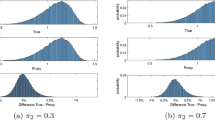Abstract
This paper analyzes discrete time portfolio selection models with Lévy processes. We first implement portfolio models under the hypotheses the vector of log-returns follow or a multivariate Variance Gamma model or a Multivariate Normal Inverse Gaussian model or a Brownian Motion. In particular, we propose an ex-ante and an ex-post empirical comparisons by the point of view of different investors. Thus, we compare portfolio strategies considering different term structure scenarios and different distributional assumptions when unlimited short sales are allowed.
Preview
Unable to display preview. Download preview PDF.
Similar content being viewed by others
References
Athayde, G.M., Flôres Jr., R.G.: Finding a maximum skewness portfolio – a general solution to three-moments portfolio choice. Journal of Economic Dynamics and Control 28, 1335–1352 (2004)
Cont, R., Tankov, P.: Financial modeling with jump processes. Chapman & Hall, Boca Raton (2004)
Ortobelli, L.S.: The classification of parametric choices under uncertainty: analysis of the portfolio choice problem. Theory and Decision 51, 297–327 (2001)
Ortobelli, L.S., Rachev, S., Huber, I., Biglova, A.: Optimal portfolio selection and Risk management: A comparison between the stable paretian approach and the Gaussian one. In: Handbook of Computational and Numerical Methods in Finance, Birkhauser, Boston, ch. 6, pp. 197–252 (2004)
Rachev, S., Mittnik, S.: Stable Paretian Models in Finance. John Wiley & Sons, New York (2000)
Staino, A., Ortobelli, L.S., Massabò, I.: A comparison among portfolio selection strategies with subordinated Lévy processes. International Journal of Compute Science and Network Security 7(7) (to appear, 2007)
Author information
Authors and Affiliations
Editor information
Rights and permissions
Copyright information
© 2007 Springer-Verlag Berlin Heidelberg
About this paper
Cite this paper
Bertini, C., Lozza, S.O., Staino, A. (2007). Discrete Time Portfolio Selection with Lévy Processes. In: Yin, H., Tino, P., Corchado, E., Byrne, W., Yao, X. (eds) Intelligent Data Engineering and Automated Learning - IDEAL 2007. IDEAL 2007. Lecture Notes in Computer Science, vol 4881. Springer, Berlin, Heidelberg. https://doi.org/10.1007/978-3-540-77226-2_103
Download citation
DOI: https://doi.org/10.1007/978-3-540-77226-2_103
Publisher Name: Springer, Berlin, Heidelberg
Print ISBN: 978-3-540-77225-5
Online ISBN: 978-3-540-77226-2
eBook Packages: Computer ScienceComputer Science (R0)




